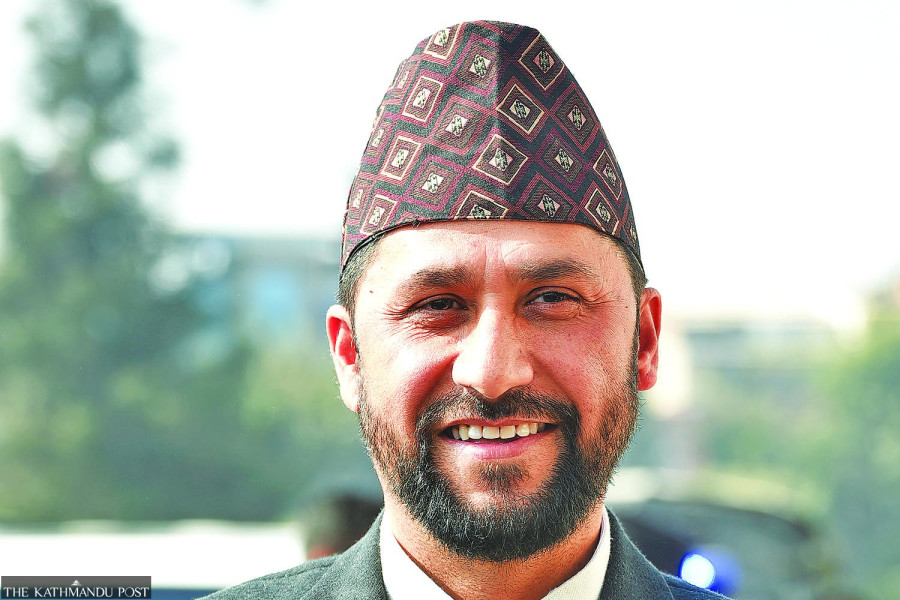National
Court denies interim order in Lamichhane citizenship case
No bar for him to continue to work as deputy prime minister, lawmaker until final verdict.
Tika R Pradhan
The Supreme Court on Friday refused to issue an interim order in a dispute over Rastriya Swatantra Party chair Rabi Lamichhane’s citizenship.
The Supreme Court’s decision means Lamichhane will remain a member of parliament and continue with his positions—deputy prime minister and home minister—for now, until a final verdict in the case.
Two individuals—Yubaraj Poudel and advocate Rabiraj Basaula—had registered a writ petition at the Supreme Court on December 14 arguing that Lamichhane cannot become a member of parliament because he doesn’t have Nepali citizenship. The writ petitioners had also demanded that the Supreme Court issue an interim order to stop Lamichhane from working as a lawmaker until the final court verdict.
Although the Supreme Court refused to issue an interim order, the constitutional bench has placed the case in priority for hearing and demanded all related documents within a week, said Poudel, the writ petitioner. “We are hopeful that the Supreme Court would give a verdict in our favour because Lamichhane has no legal basis to prove his point.”
Poudel said he has received death threats from Lamichhane’s supporters for dragging him to court.
The petitioners have accused Lamichhane of not reacquiring Nepali citizenship after having ceded his US citizenship.
The petitioners had accused Lamichhane of holding both US and Nepali citizenship. Lamichhane was found to have produced a copy of his Nepali citizenship while filing his nomination papers for election to become a member of the lower house from Chitwan-2. Holding dual citizenship is illegal in Nepal.
The constitutional bench led by the acting Chief Justice Hari Krishna Karki including justices Ishwar Prasad Khatiwada, Ananda Mohan Bhattarai, Anil Kumar Sinha and Prakash Man Singh Raut decided not to issue the interim order as demanded by the petitioners.
“Now it is not appropriate to issue an interim order due to the balance of convenience,” stated the decision of the constitutional bench. “The questions raised need to be resolved quickly through a final hearing, at the earliest.”
The bench also decided to hear the case on a priority while responding to two writ petitions that had been filed demanding the annulment of Lamichhane’s membership of the House of Representatives.
The next hearing in the case is scheduled for January 25. The bench has also ordered both parties to present their hearing notes by January 25 and present all related documents from the Home Ministry or the Immigration Department or the District Administration Office, within a week.
The bench also maintained that further decision in the case will come only as a final verdict. This means Lamichhane will continue in his current positions of power until the final verdict.
The petitioners had demanded that Lamichhane should also be removed from the post of party chief. The petitioners had also said that only Nepali citizens have a constitutional right to vote in the elections, become election candidates and form political parties in the country. The petitioners had contended that Lamichhane’s positions as a member of the lower house and party president were illegal and therefore, untenable.
Arguing on behalf of Lamichhane, senior advocates Sushil Panta and Sunil Pokhrel said Lamichhane had not abandoned his Nepali citizenship while taking a US citizenship and therefore, he need not apply for Nepali citizenship anew after relinquishing his US citizenship.
Lamichhane had surrendered his US citizenship on June 20, 2018.
However, Section 10(1) of the Citizenship Act 2006 states that Nepali citizenship would cease to exist once a person takes citizenship of a foreign nation.
Section 10(1) says any citizen of Nepal who voluntarily acquires citizenship of any foreign country shall automatically lose the citizenship of Nepal.
This, according to legal experts, means that anyone abandoning foreign citizenship must begin the process of getting Nepali citizenship, afresh.
But the lawyers pleading in favour of the writ petitioners, including senior advocates Surendra Bhandari, Bishnu Prasad Luitel, Raman Karna and Amrit Kharel claimed that Lamichhane, due to his failure to begin any process to obtain a Nepali citizenship as per Section 10(1) of the Citizenship Act 2006, his position as the member of House of Representatives must be scrapped.
“As Home Minister, Rabi Lamichhane has influenced the ongoing investigation. Therefore, he cannot continue in his position in which he has a conflict of interest.” senior advocate Bhandari said while pleading before the bench.
The plaintiffs also claimed that Lamichhane had not initiated the process to acquire Nepali citizenship as per section 11 of the Nepal Citizenship Act 2006 and Clause 11 of the Nepal Citizenship Rules 2006.
Clause 11 (1) of the rules that state the procedures for resumption of citizenship of Nepal says, if any person who has renounced the citizenship of Nepal pursuant to Section 11 of the Act and gone abroad intends to acquire the citizenship of Nepal again, such a person shall have to submit an application, in the format referred to in Schedule-11, accompanied by a proof showing the renunciation of foreign citizenship, at the ministry or the district administration office that had previously issued the certificate of citizenship to that person.




 9.63°C Kathmandu
9.63°C Kathmandu















